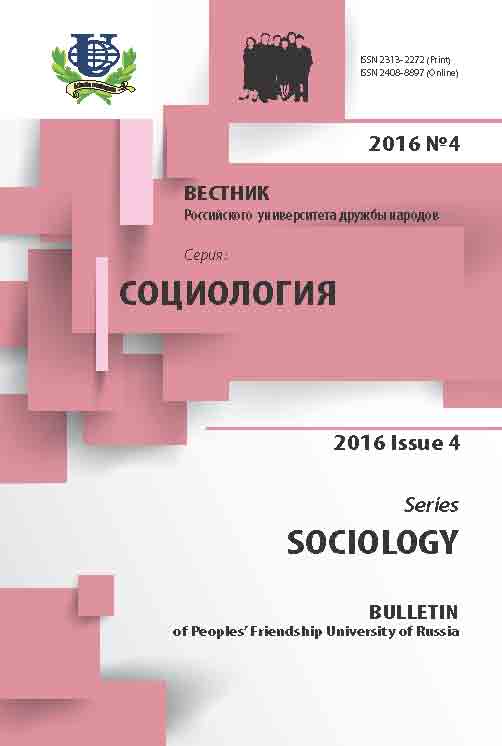Migration policies of Moscow authorities and Muscovites’ public opinion
- Authors: Gasparishvili AT1, Onosov AA2
-
Affiliations:
- Center for Social Technologies
- Lomonosov Moscow State University
- Issue: Vol 16, No 4 (2016)
- Pages: 808-815
- Section: Surveys, experiments, case studies
- URL: https://journals.rudn.ru/sociology/article/view/14813
- ID: 14813
Cite item
Full Text
Abstract
The article considers basic directions of the migration policies in the Moscow Region as the main attractive area for international labor migrants in the Russian Federation. Based on the statistical and sociological data (the results of public opinion survey and interviews with experts) the authors describe the current situation with the migration in the city of Moscow and in the Moscow Region in general focusing on the multidimensional characteristics of the Muscovites’ attitudes towards foreign labor migrants. The article shows that it the Muscovites’ perception of migrants there are three relatively independent vectors: cultural, economic, and social-political. The article also considers the Russian population’s assessments of the positive and negative contribution of labor migrants in the social and cultural dynamics of the Moscow Region on specific thematic lines. Within the framework of the existing scientific approaches to the study of labor migration, the authors analyze the current migration processes, identify future trends of their development and indicate positive and negative impacts of these processes on social stability at the regional and national levels. The article highlights perspectives for resolving major problems related to labor migration with the special attention to the issues of adaptation and integration of migrants into the metropolitan society. The authors indicate main vectors and frameworks of the Moscow authorities’ migration policies, and emphasize the need to design the differentiated policy of integration that takes into account peculiar characteristics of different categories of migrants.
About the authors
A T Gasparishvili
Center for Social Technologies
Author for correspondence.
Email: gasparishvili@gmail.com
Moscow, Russia
A A Onosov
Lomonosov Moscow State University
Email: o_shura@mail.ru
Moscow, Russia
References
- Alisov N.A., Gasparishvili A.T., Isayev A.K., Onosov A.A. Trudovaja migracija v Moskve: fakty, mnenija, perspektivy. Situacionnyj analiz i modelirovanie nacional'noj migracionnoj strategii [Labour Migration in Moscow: Facts, Opinions, Perspectives: Situation Analysis and Modeling of the National Migration Strategy]. Moskva: Izdatel'stvo MGU, 2015.
- Andronov I.S. Problema sociokul'turnoy adaptatsii migrantov v Rossii [The problem of social and cultural Adaptation of Migrants in Russia]. Contemporary Problems of Science and Education. 2013. No. 3.
- Doklad o rezul'tatah i osnovnyh napravleniyah deyatel'nosti Upravleniya Federal'noy migratsionnoy sluzhby po gorodu Moskve na 2013 god i planovyy period 2014-2015 godov [A Report on the Results and Basic Directions in the Work of Federal Migration Service Directorate of the City of Moscow for 2013 and the period of 2014-2015]. М., 2013.
- Kontseptsiya obshchestvennoy bezopasnosti v Rossiyskoy Federatsii [Conception of Public Safety in the Russian Federation]. URL: http://www.kremlin.ru/acts/19653.
- Moskva i migranty. O sostoyanii trudovoy migratsii v stolitse [Moscow and Migrants. On the Situation with the Labour Migration in Moscow]. URL: http://ria.ru/infografika/20130530/ 940216250.html.
- Mukomel V. Politika integratsii migrantov v Rossii: vyzovy, potentsial, riski: rabochaya tetrad' [Migrant Integration Policies in Russia: Challenges, Potential, Risks: A Workbook]. M.: Spetskniga, 2013.
- Mursaliev A. Aktual'nye voprosy adaptatsii i integratsii migrantov [Urgent Issues of Adaptation and Integration of Migrants]. URL: http://riavesti.com/society/aktualnye-voprosy-adaptacii-i-integracii-migrantov.
- Otchet mera Moskvy Sergeya Sobyanina Moskovskoy gorodskoy Dume o rezul'tatah deyatel'nosti Pravitel'stva Moskvy v 2012-2013 godakh [The Report of the Moscow Mayor Sergey Sobyanin to the City Duma on the Work of Moscow Government in 2012-2013]. URL: https://regnum.ru/news/1720717.html.
Supplementary files













